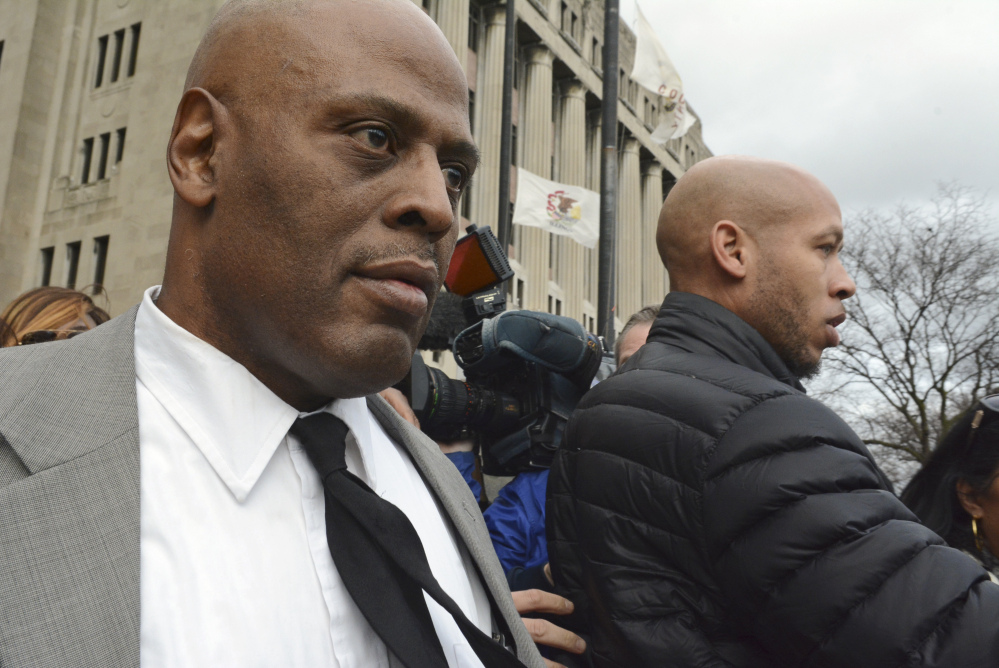CHICAGO — A county judge on Monday acquitted a Chicago police commander accused of shoving his gun down a suspect’s throat, outlining what she said were flaws in the state’s case and stressing that it shouldn’t be conflated with other recent incidents of alleged police misconduct in the city and elsewhere.
Meanwhile, a federal judge ruled in a separate civil case that an officers used excessive force by dragging a handcuffed man from his cell after he had been subdued with stun guns. Video of the 2012 incident was among several released recently amid heavy criticism of the Chicago Police Department’s treatment of minorities.
In the criminal case, Cook County Judge Diane Cannon found Cmdr. Glenn Evans not guilty of aggravated battery with a deadly weapon and official misconduct stemming from the 2013 arrest of Rickey Williams, whom Evans believed he had seen holding a gun. Both Evans and Williams are black.
Cannon said she didn’t find Williams’ story believable, accusing him of changing it repeatedly. And she dismissed evidence thought to be among the most damning – Williams’ DNA on Evans’ gun – suggesting it was collected so sloppily that that it was of “fleeting relevance.”
Evans showed little reaction upon hearing the verdict. He could have faced up to five years in prison.
Williams’ lawyers issued a statement saying they will proceed with a lawsuit and are confident they’ll meet the burden of proof needed to show that Evans violated Williams’ rights.
The trial unfolded against a backdrop of protests over the killing of a black teenager by a white police officer in October 2014 and the subsequent investigation. Critics have accused the department and the city of trying to cover up the circumstances surrounding Laquan McDonald’s death. The officer who shot him 16 times was charged with murder last month only hours before the department released police dashcam video of the shooting after being ordered to do so by a judge.
Evans was the subject of at least 45 excessive-force complaints over a 20-year period, according to the People’s Law Office in Chicago. Critics pointed to that total as evidence of the department’s willingness to condone or at least ignore the brutal behavior of its officers.
Prosecutors alleged that Evans tackled Williams and stuck his gun in the suspect’s mouth while demanding to know where he had put the gun he thought he saw Williams holding. Williams testified that he hadn’t been carrying a gun and that Evans must have mistaken it for a cellphone he had been holding. He said Evans shoved his gun so far down his throat that he gagged and later spat blood.
Investigators never recovered a gun, and the charges against Williams were dropped.
Cook County State’s Attorney Anita Alvarez, whose resignation protesters have been clamoring for, defended her decision to charge Evans.
“This case underscores the reality that it is extremely difficult to convince judges or juries in Cook County and around the country to convict police officers of misconduct in the line of duty, despite the fact that this victim made an immediate outcry and we had DNA evidence to support our case,” said Alvarez.
In the federal lawsuit, the judge ruled that an officer “chose to use brute force when it was no longer necessary” when he dragged an unmoving Philip Coleman from his cell. He also ruled that the officer’s supervisor should have intervened.
Coleman, 38, died later at a hospital following a reaction to an anti-psychotic drug. The ruling only pertained to how Coleman was dragged from his cell, not how he died.
A jury will decide the amount in damages.
The Evans verdict marks the second time this year that Cook County prosecutors have suffered a high-profile defeat after bringing charges against a Chicago police officer.
Dante Servin was charged with involuntary manslaughter and other charges in the shooting death of an unarmed black woman in 2012, but in April a judge suggested that prosecutors filed the wrong charges against the officer and acquitted him.
Copy the Story LinkSend questions/comments to the editors.



Success. Please wait for the page to reload. If the page does not reload within 5 seconds, please refresh the page.
Enter your email and password to access comments.
Hi, to comment on stories you must . This profile is in addition to your subscription and website login.
Already have a commenting profile? .
Invalid username/password.
Please check your email to confirm and complete your registration.
Only subscribers are eligible to post comments. Please subscribe or login first for digital access. Here’s why.
Use the form below to reset your password. When you've submitted your account email, we will send an email with a reset code.